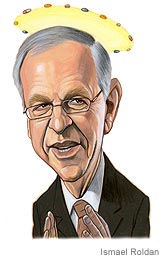 CEO of drug company Eli Lilly. Source of image: online version of WSJ artcle cited below.
CEO of drug company Eli Lilly. Source of image: online version of WSJ artcle cited below.
NEW YORK — Is the future of your health riding on what happens in Washington? Sidney Taurel thinks it might be. The Eli Lilly CEO ticks off a list of former "death sentences" being cured or turned into chronic conditions — "AIDS, leukemia, Hodgkins, hopefully solid tumors within the next few years. The potential for medical research is unlimited. We just need to make sure we don’t interdict it by the wrong policies."
And what might those "wrong policies" be? Anything, it would appear, that reduces the financial incentives for drug companies to invest in research and development. Mr. Taurel points without hesitation to the mere threat of HillaryCare in the early 1990s as an episode that reduced investment in R&D, as drug makers, including his own, redirected money toward the purchase of pharmacy benefit management companies. As another example, he offers the anti-drug industry crusade of Sen. Estes Kefauver in the late 1950s and early ’60s:
"At that point companies started to diversify. We bought Elizabeth Arden, we went into animal health and agricultural chemical products, later on in medical instruments and so forth. All other companies did similar things. And for a while after that we saw fewer new products. When this threat subsided the companies focused again on R&D and we saw a golden era in the ’80s and ’90s with a lot of new products and breakthroughs."
For the full interview, see:

